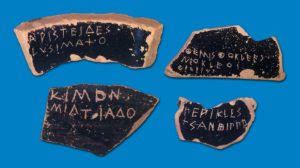[Greek] ὀστράκινος (ostrakinos), [Latin] fictilis: potshard, clay, tile, earthenware, earthen vessel, shell; 2Cor.4:7, 2Tim.2:20

Pottery shards were used in voting to banish those who were perceived as threatening the stability of the state. The names of the persons to be banished were written on these shards.
Background Information:
Ostracism:
- In ancient Greece ostracism (ostrakismos) was a procedure under Athenian democracy in which any citizen could be expelled from Athens for ten years.
- There were some times when a prominent citizen was perceived as threatening the stability of the state.
- A political practice was established in which this citizen could be banished without bringing any charges against him.
- People decided, without debate, whether to hold a vote of ostracism of that person.
- Unlike a trial, no defense could be mounted by the person expelled. The vote occurred by the wishes of the electorate.
- If the people voted yes, then an ostracism would be held two months later.
- The people would vote using clay shards, which were considered like ancient scrap paper. The voter scratched the name of the person on his shard and deposited the shard in an urn.
- The person who received the most votes would be given 10 days to leave the city. The banished person would still be able to hold his property.
Old Testament: Pottery shards were less expensive than papyrus sheets in the ancient world. Shards were used for engraving scriptures, letters, inventory lists, notes, receipts, and manuscripts. The Dead Sea Scrolls were found inside clay pots near Qumran.
New Testament: This term, meaning vessel, refers to men (members of the Church).
This treasure (glory of Christ) is held in earthen vessels (men).
Paul also speaks of the Church having both precious and useless vessels. Likewise, those useless vessels will bring dishonor, opposition, and destruction.
2Cor.4:7: “But we hold this treasure in earthen vessels that the surpassing power may be of God and not from us.” (Paul speaks of the paradox of the ministry. These earthen vessels are fragile, broken, and flawed followers of Christ. This treasure is the glory that He preaches and into which these vessels are transformed.)
2Tim.2:20: “In a large household there are vessels not only of gold and silver but also of wood and clay, some for lofty and others for humble use.” 2Tim.2:20 (The Church includes both precious and useless vessels.)
Etymology: The Greek ostrakon is also related to the Greek osteon, meaning bone and oyster. This term is also related to the French oistre. The Latin fictilis, meaning made of earthenware, is related to the Latin verb fingere, meaning to mold or fashion. The Latin fictio means a making, fashioning, or feigning. Essentially, fiction is something which is invented or imagined.
Cancel culture: It seems our recent cancel culture has become the latest version of ostracism in this age of news media, social media, tech giants, and academia. Trump supporters, conservatives, Christians, and others have been continually ostracized, being called Hitler, fascists, garbage deplorables, racists, hateful, bigots, and other such terms. TV shows and consumer products are also subject to cancellation.
Conclusion:
Ostracism, ostracize, oyster, fiction
Even in ancient Athens, there existed a form of cancel culture. Unlike a judicial procedure, anyone could bring up a measure to ostracize someone. A person could be summarily banished with out being accused of any charges. The abundance of pottery shards were likened to ancient scrap paper. Historical evidence shows that ostracism was initiated for both valid and invalid reasons (political antagonism and hatred). Socrates was ostracized because he mocked the court. The kids’ game Ostrakinda was a form of ancient dodgeball using sea shells.
In the Old Testament, Lam. 4:2 describes the abandoned, starving, and killed children like being regarded as broken earthen jars. This imagery continues the notion of man being fragile, broken, imperfect, and vulnerable earthen vessels (2Cor.4:7). Within these fragile vessels contains the surpassing power to spread and share the word of God. The Church contains both precious (good) and useless (indifferent and evil) vessels.
Update: Recent efforts have been made to impeach, to ostracize, to remove, to incriminate, and to assassinate President Trump.
President Biden just recently called all of of Trump’s supporter as garbage. (They are just say what they really think about them.)
Billionaire Mark Cuban idiotically stated that Trump does not surround himself with strong and intelligent women. Mark Cuban has just insulted many conservative women.
Who would have thought that this term would lead to fictio (fiction)! (You really can’t make this up) ☺☺☺

